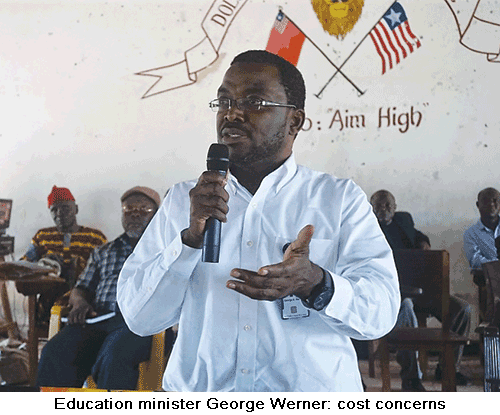 At a school in the township of West Point, Monrovia, a teacher should be halfway through her maths lesson. Instead she is eating lunch. A din echoes around the room of the government-run school as 70 pupils chat, fidget or sleep on their desks. Neither these pupils nor the rest of Liberia is learning much. Bad teaching, a lack of accountability and meagre budgets — as in India whose middle class dreams of global superpower status — have led to awful schools. More than one-third of second-grade pupils cannot read a word; since many are held back, teenagers often share classes with six year olds. In 2014, only 13 candidates out of 15,000 passed an entrance exam to the University of Liberia. In 2013 none did.
At a school in the township of West Point, Monrovia, a teacher should be halfway through her maths lesson. Instead she is eating lunch. A din echoes around the room of the government-run school as 70 pupils chat, fidget or sleep on their desks. Neither these pupils nor the rest of Liberia is learning much. Bad teaching, a lack of accountability and meagre budgets — as in India whose middle class dreams of global superpower status — have led to awful schools. More than one-third of second-grade pupils cannot read a word; since many are held back, teenagers often share classes with six year olds. In 2014, only 13 candidates out of 15,000 passed an entrance exam to the University of Liberia. In 2013 none did.
George Werner admits that when he was made education minister of Liberia (pop.4.7 million) in 2015, “my heart sank”. But he soon got to work. He removed 1,892 dead or retired teachers from the government’s payroll, saving $3.3 million (Rs.26.7 crore) or 7 percent of the tiny education budget of $45.6 million (Rs.302 crore). In September, Werner went further, launching Partnership Schools for Liberia (PSL), a pilot which, if successful, could inspire similar innovation across Africa.
PSL is based on the charter schools in America and academies in England models. In each case independent operators run free schools that are at least partly funded by the government. In the PSL scheme eight operators, three of which are for-profit groups, have taken over a total of 93 public schools. A randomised controlled trial will analyse whether their pupils do better than peers in traditional schools.
But just six months in, PSL is under fire. Education International, a global group of teachers’ unions, and ActionAid, a charity, are funding an investigation into the programme. Their opposition is partly ideological: they don’t like for-profit schools. But two of their concerns are pertinent — indeed, Werner and researchers evaluating the PSL project, also recognise them.
The first is that the PSL schools play by different rules. There is a cap of 65 on most of their class sizes, for example, which has prompted allegations that some operators are turfing out less clever pupils. That would be unfair and against the rules of the pilot.
The second concern is cost. The government pays for teachers’ salaries. Operators also receive $50 (Rs.3,300) per pupil per year from a pot of philanthropic cash managed by the ministry and Ark, a London-based education charity. Most students/parents spend extra money on top of that. Operators have submitted estimates of their costs ranging from $60 to more than $1,000 per child per year.
For Werner, questions about the cost of the project are most acute when he considers the role of Bridge International Academies. Bridge, a chain of for-profit schools, has raised $140 million (Rs.926 crore) from investors such as Mark Zuckerberg. But it is not close to breaking even, losing about $1 million a month as a result of its high fixed costs, such as having a research team in America.
One way Bridge is trying to turn a profit is to run public schools as well as private ones. Liberia is thus a test case. As part of the pilot, Bridge runs 25 schools there, more than any other provider. Josh Nathan, Bridge’s academic director in Liberia, says that the firm would like to cover all 2,700 schools around the country.
On February 22 Werner announced that from September, PSL would add another 100 or so schools. Expansion will irk critics. But they should remember how bad things are. Far too many education ministers choose to accept the status quo. PSL is an experiment, and one worth trying. Unfortunately, with an election due in October, a new government could scrap the scheme. In Liberia, where exams are proving too tough for too many, that would represent the biggest failure of all.